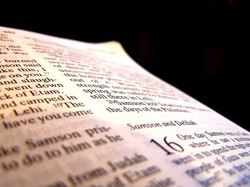
Not everything is found in books
People who are raised in the Judeo-Christian tradition are used to the idea of religious truth being written down in a sacred canonical text like the Bible or the Torah. In fact, the first book ever printed on a printing press in Europe was a Bible, and for many years, the majority of books in print were religious texts. That's how important it is to us in our culture to have something written we can study, so we can know for sure that we're doing things "the right way." Many of us attend Sunday school or go to class to learn about our religion. Religious instruction is formal, carried out by teachers who know scripture. Everything is written in a book, and what's in the book is the law. The belief that we can study religion and know it through book learning is so deeply ingrained in us, that it's hard for some people to accept Santería as a bona fide religion precisely because it has no Holy Book, and no centralized authority figure who interprets doctrine for all practitioners.
The fact that Santería has been kept alive for hundreds of years via oral tradition is understandable in historical context - in Cuba, slaves could not read and write - but in practical terms, it means there's no "how to" manual for Santería. Someone who wants to know what "authentic Santería" is like, and who imagines that all knowledge about the religion can be written down, agreed upon, and put into practice the same way by millions of people around the world, well, this person will be bitterly disappointed. Looking for the single right way to do something in Santería is like looking for the pot of gold at the end of the rainbow. It always eludes us, because it doesn't really exist.
The fact that Santería has been kept alive for hundreds of years via oral tradition is understandable in historical context - in Cuba, slaves could not read and write - but in practical terms, it means there's no "how to" manual for Santería. Someone who wants to know what "authentic Santería" is like, and who imagines that all knowledge about the religion can be written down, agreed upon, and put into practice the same way by millions of people around the world, well, this person will be bitterly disappointed. Looking for the single right way to do something in Santería is like looking for the pot of gold at the end of the rainbow. It always eludes us, because it doesn't really exist.
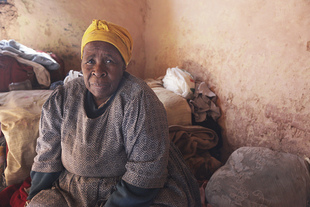
Elders teach by example
Learning through oral tradition engages the mind in a different way than book learning. First, it requires a lot more time, because it requires a lot of repetition and memorization. The initiate has to be patient, listen, learn, absorb, meditate, and accept the limits of his knowledge as a beginner. Until a solid foundation has been laid, more complex ideas simply won't make sense, no matter how intelligent you are. Elders will tell you that Santería requires the head (the mind) to be transformed via the aché (energy) of the Orichás, and this is something that happens very slowly, poco a poco (little by little). A popular refrán (proverb) says: The most certain way to know nothing is to learn everything all at once and too quickly. Another refrán reminds us that no one knows everything, because knowledge was spread all over the world: No matter how much you think you know, you never know it all. One head can't hold that much knowledge.
These sayings suggest that Santería views learning as a lifelong process, and one that's never fully complete. There are definitely rules about how things should be done, and learning to respect the rules is an important part of spiritual development. But, the only way you can learn what's right and what's wrong, what's expected and what's going to cause problems for you, is by listening to your godmother or godfather, learning how things are done in your particular lineage, and participating in religious activities with your community. The elders will teach you, poco a poco, what you need to know, when you're ready to know it. As the learner, you can't set the pace; the teacher sets it for you. However, most teachers are delighted to find students who want to learn and who are serious about the religion. In emotionally healthy communities, elders share their knowledge with younger Santeros/as to guarantee the knowledge isn't lost.
These sayings suggest that Santería views learning as a lifelong process, and one that's never fully complete. There are definitely rules about how things should be done, and learning to respect the rules is an important part of spiritual development. But, the only way you can learn what's right and what's wrong, what's expected and what's going to cause problems for you, is by listening to your godmother or godfather, learning how things are done in your particular lineage, and participating in religious activities with your community. The elders will teach you, poco a poco, what you need to know, when you're ready to know it. As the learner, you can't set the pace; the teacher sets it for you. However, most teachers are delighted to find students who want to learn and who are serious about the religion. In emotionally healthy communities, elders share their knowledge with younger Santeros/as to guarantee the knowledge isn't lost.
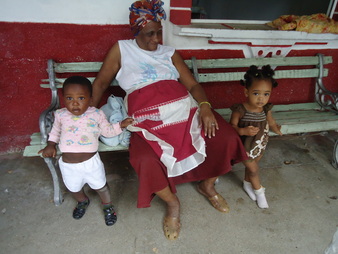
The elders guide us in many ways
In Cuba, especially in small provincial cities like Palmira, everyone in the Santería community knows everyone, they know the lineage they come from, they know the godparents, the parents and grandparents of the godparents, and if they trace history back enough generations, they'll probably even discover blood families ties to each other. Iyabós (novices, new initiates) are held accountable and carefully watched by elders in the community, who don't hesitate to correct behavior that's inappropriate, or report to the godparent any kind of misconduct. Social pressure to conform to the expected norms of the ilé (community of Santería worshippers) keeps people in line, and makes sure there's uniformity within that community. Everyone knows who's serious about the religion and who's not, who does things properly and who doesn't. Everyone knows the elders, they know who's an oriaté (master of religious ceremony), who's an expert at divination, who knows herbs, in short, they know who to ask when they're in doubt, and there's no need to have it written down in a book, because they have their elders at hand.
If you're not initiated and don't belong to a community of Santeros, what are you supposed to do? Fortunately, many skilled priests are writing about the religion now, both in book form and on the internet. Much more written information is available now than ever before, and there's less reluctance on the part of Santeros/as to share information with outsiders. My advice is to read a variety of sources and look for common threads, patterns, and general observations that seem to be repeated by multiple authors. Use your critical thinking skills to question the qualifications of the writer, the reliability of the information, and the author's motive for writing. Think about what you read, and keep an open mind. Use book learning to understand in theory what the religion is like, but don't forget that book learning has limits. Avoid writers who claim to possess the absolute and only truth, especially if they're arrogant and disrespectful of other people. After you've looked at some books and some internet sites, you'll start to get a sense of who gives reliable information and who doesn't. Trust your judgment, and let your head lead you in the direction you need to go in.
Here are two websites that provide reliable accurate information. The authors are experienced Santeros with a solid base of knowledge:
http://santeriachurch.org/
http://ochanilele.wordpress.com/
If you're not initiated and don't belong to a community of Santeros, what are you supposed to do? Fortunately, many skilled priests are writing about the religion now, both in book form and on the internet. Much more written information is available now than ever before, and there's less reluctance on the part of Santeros/as to share information with outsiders. My advice is to read a variety of sources and look for common threads, patterns, and general observations that seem to be repeated by multiple authors. Use your critical thinking skills to question the qualifications of the writer, the reliability of the information, and the author's motive for writing. Think about what you read, and keep an open mind. Use book learning to understand in theory what the religion is like, but don't forget that book learning has limits. Avoid writers who claim to possess the absolute and only truth, especially if they're arrogant and disrespectful of other people. After you've looked at some books and some internet sites, you'll start to get a sense of who gives reliable information and who doesn't. Trust your judgment, and let your head lead you in the direction you need to go in.
Here are two websites that provide reliable accurate information. The authors are experienced Santeros with a solid base of knowledge:
http://santeriachurch.org/
http://ochanilele.wordpress.com/

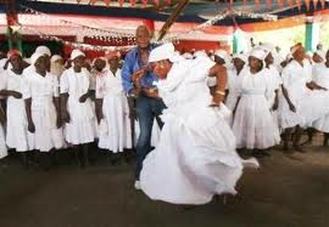
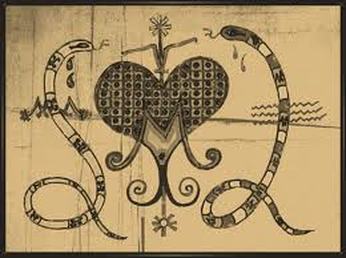
 RSS Feed
RSS Feed
